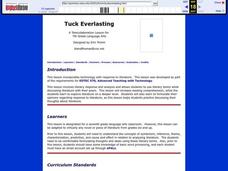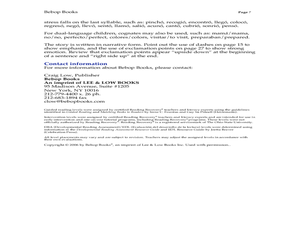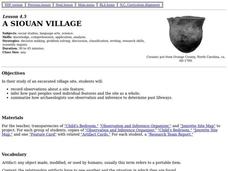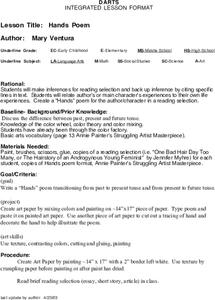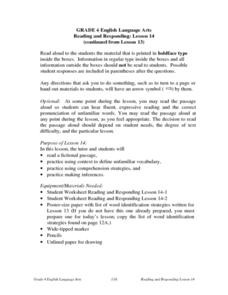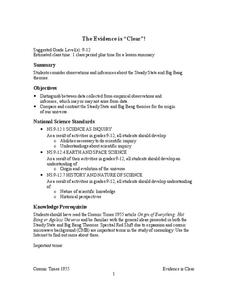Curated OER
Two Greedy Bears
Improving listening comprehension skills is the goal of this language arts lesson. Young readers listen to the story Two Greedy Bears, stopping to have discussions with a partner. They predict outcomes and make inferences based on...
Curated OER
Matthew Henson
Discuss the work of Matthew Henson, an African American who traveled to the North Pole with Robert Peary. After reading the story "Matthew Henson" by Maryann N. Weidt, learners answer questions by drawing inferences and conclusions,...
Curated OER
Making Inferences: Scenario Worksheet
In this making inferences worksheet, students read 5 statements and they write what they can infer about each statement. Students make their own inference scenario and identify what they can infer from their scenario.
EngageNY
Mid-Unit Assessment and Discussing Themes in Esperanza Rising: (Chapter 9: "Las Ciruelas/PLums")
Give this skills-based assessment halfway through your unit on Esperanza Rising. After a brief review, class members take the test, which asks them to show that they know how to analyze the novel independently. They are asked to...
Curated OER
Tuck Everlasting
Seventh graders use literary terms while discussing literature with their peers. They explore literature on a deeper level. Students formulate their opinions regarding response to literature, as this lesson helps students practice...
Curated OER
Questioning
Practice making predictions by looking at the cover of a book. You can use The Hungry Thing, as suggested here, or any other book you may be reading in class. Use the predictions to talk about good reading strategies. A chart is...
Curated OER
Guided Reading with Elizabeti's Doll
Practice reading strategies using Elizabeti's Doll by Stephanie Stuve-Bodeen. Readers utilize decoding and comprehension strategies before, during, and after reading the story. A detailed list of text features, high frequency words,...
Crafting Freedom
Harriet Jabocs and Elizabeth Keckly: The Material and Emotional Realities of Childhood in Slavery
Learning how to make accurate inferences by putting together facts found in multiple sources is one of those skills all learners must develop, but one that can be a challenge to teach. This resource is a must-have for your curriculum...
K20 LEARN
OPTIC - A Reading Strategy Recipe: Visual Literacy
A visual literary lesson provides learners with OPTIC (Observations, Predictions, Themes, Inferences, Conclusions), a reading strategy to help them understand and interpret visual and written texts. Scholars practice the strategy with a...
Curated OER
Teaching Inference with Trash and Mystery Objects
Students practice solving mysteries and using inference skills by digging through trash. In this problem solving lesson, students investigate groups of garbage to determine what type of person the garbage belonged to....
Curated OER
Inference Lesson Plan
Students practice assessing graphics to infer and identify an author's implicit and explicit meaning in a piece of text. They evaluate the effectiveness of information found in maps, charts, tables, graphs, diagrams, cutaways and through...
Curated OER
A Siouan Village
Fourth graders examine the artifacts obtained from an excavated Siouan village site. They make inferences about the people who once lived there based on the artifacts and complete a Research Team Report.
Curated OER
Motel of Mysteries
Students determine that even though inferences are based on observations that does not mean they are always true or correct. They pull the topics and main ideas out of a piece of difficult text.
Curated OER
Hands Poem
Students create a "Hands" poem for the author/character in a reading selection.They make inferences for reading selection and back up inference by citing specific lines in text. They relate author's or main character's experiences to...
Curated OER
Pop Rock Chemistry
In this pop rock chemistry worksheet, young scholars suck on pop rocks, they mix open pop rocks with water and they observe them on a paper towel with water. Students write down as many observations as they can and they write down as...
Curated OER
Qualitative and Quantitative Observations
In this qualitative and quantitative observation worksheet, students determine if 10 given observations are quantitative or qualitative. They write a qualitative and quantitative statement and they write an observation and inference...
Curated OER
Reading and Responding -- Lesson 14
Fourth graders work independently or in a small group to (1) read a fictional passage, (2) use context clues to define unfamiliar vocabulary, (3) use comprehension strategies, and (4) make inferences. Reading passages and comprehension...
Curated OER
Big Bushy Mustache: comprehension skills
In this comprehension skills worksheet, learners read the book Big Bushy Mustache and complete comprehension activities. Students complete 5 activities including note taking, making inferences, fiction and non fiction, drawing...
Curated OER
Tomas and the Library Lady
Students practice read aloud comprehension strategies. In this literacy comprehension lesson, students listen to Tomas and the Library Lady, stopping to discuss with a partner aspects of the story suggested by the teacher. Students make...
Ohio Department of Education
Observe Then Infer
To develop their skill at drawing inferences from observations, sixth graders rotate through six stations, conduct a series of experiments, make observations, and draw inference from what they observe.
National Park Service
A Tale of Two Men
Theodore Roosevelt and the Marquis de Mores were both born in 1858, and both came to the Dakota territory in 1883, but they influenced the developing country of America in different ways. Elementary and middle schoolers apply written and...
American Statistical Association
More Confidence in Salaries in Petroleum Engineering
Making inferences isn't an exact science. Using data about salaries, learners investigate the accuracy of their inferences. Their analyses includes simulations and randomization tests as well as population means.
Curated OER
Young Readers Make Inferences with Little Bear
Maurice Sendak’s illustrations reveal implicit truth in the classic children's book Little Bear.
NASA
The Evidence is “Clear”!
Do you think you know better? Become a scientist and prove it. Scholars review the evidence for two different theories of the origins of the universe. They notice the empirical observations as well as the inferences to determine which is...
Other popular searches
- Making Inferences Worksheet
- Observation and Inferences
- Making Inferences in Reading
- Reading Making Inferences
- Making Inferences Grade 2
- Making Inferences Stories
- Lesson Making Inferences
- Inferences and Context Clues
- Generalizations / Inferences
- Inferences in Reading
- Reading Inferences
- Making Inferences 3rd Grade






